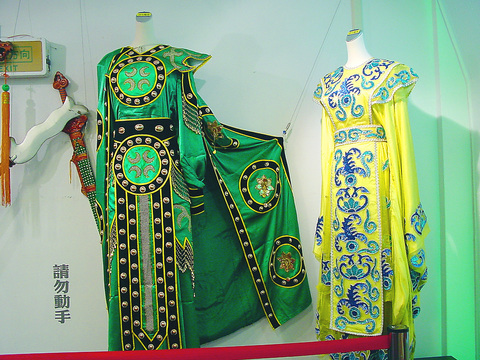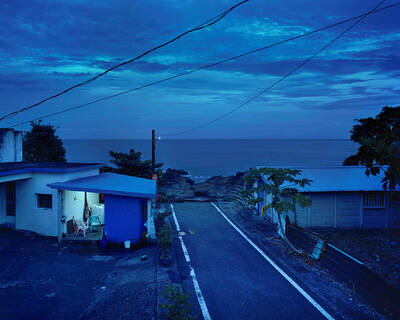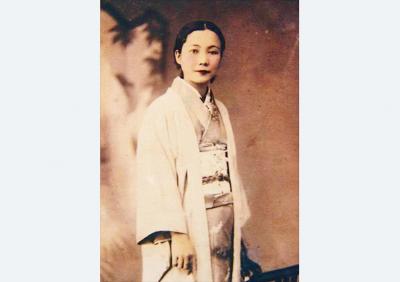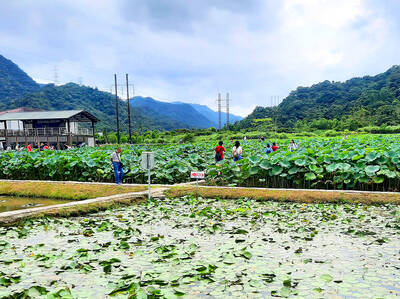For the first time in Taiwan's history, a nearly three-month-long festival devoted to the art of Taiwanese opera has been launched, last month at the National Center for Traditional Arts (國立傳統藝術中心), in Ilan County (宜蘭縣).
Sponsored by Uni-President Yi-Lan Art and Culture Corp (
The main purpose of the festival is to present the history of Taiwanese opera since its inception in Ilan in the early 1900s.

PHOTOS: DEREK LEE, TAIPEI TIMES
Opera started out as a means of outdoor entertainment for Taiwanese farmers and villagers and a way to worship gods on their birthdays. During the 1920s, the Japanese colonial government imposed strict restrictions on opera performances and forced the troupes to sing and act inside theater houses, so the the public could be controlled better.
Some of the well-known troupes were invited to perform in southern Fujianese cities, where people spoke the same Min-dialect.
From 1949 to 1956, when the Chinese Nationalist Party (KMT) took over control of Taiwan the number of registered Taiwanese Opera troupes was more than 500.

As radios, records and film impacted unfavorably on the opera business, the troupes learned to adapt and record their performances.
In the 1960s, however, the opera business was at a low and the number of opera troupes was reduced to about 100. This lasted until the 1970s when TV stations started to organize their own troupes and stage broadcasts of Taiwanese opera.
Many big-name stars such as Liao Qiong-zhi (
As to the content, there have also been changes. Previously, the stories were based on historical and folk legends. Nowadays, opera tries to address modern issues, such as national identity, judicial problems and bilateral relations between Taiwan and China.
Modern-content operas such as Taiwan, My Mother (2000) (台灣我的母親), A Case of a Court Judge (1991, 曲判記), Flower on the Other Side of the Bank (2001, 彼岸花), seem to have caught a new wave of popularity and have created another golden era for Taiwanese opera.

In 2020, a labor attache from the Philippines in Taipei sent a letter to the Ministry of Foreign Affairs demanding that a Filipina worker accused of “cyber-libel” against then-president Rodrigo Duterte be deported. A press release from the Philippines office from the attache accused the woman of “using several social media accounts” to “discredit and malign the President and destabilize the government.” The attache also claimed that the woman had broken Taiwan’s laws. The government responded that she had broken no laws, and that all foreign workers were treated the same as Taiwan citizens and that “their rights are protected,

A white horse stark against a black beach. A family pushes a car through floodwaters in Chiayi County. People play on a beach in Pingtung County, as a nuclear power plant looms in the background. These are just some of the powerful images on display as part of Shen Chao-liang’s (沈昭良) Drifting (Overture) exhibition, currently on display at AKI Gallery in Taipei. For the first time in Shen’s decorated career, his photography seeks to speak to broader, multi-layered issues within the fabric of Taiwanese society. The photographs look towards history, national identity, ecological changes and more to create a collection of images

March 16 to March 22 In just a year, Liu Ching-hsiang (劉清香) went from Taiwanese opera performer to arguably Taiwan’s first pop superstar, pumping out hits that captivated the Japanese colony under the moniker Chun-chun (純純). Last week’s Taiwan in Time explored how the Hoklo (commonly known as Taiwanese) theme song for the Chinese silent movie The Peach Girl (桃花泣血記) unexpectedly became the first smash hit after the film’s Taipei premiere in March 1932, in part due to aggressive promotion on the streets. Seeing an opportunity, Columbia Records’ (affiliated with the US entity) Taiwan director Shojiro Kashino asked Liu, who had

The recent decline in average room rates is undoubtedly bad news for Taiwan’s hoteliers and homestay operators, but this downturn shouldn’t come as a surprise to anyone. According to statistics published by the Tourism Administration (TA) on March 3, the average cost of a one-night stay in a hotel last year was NT$2,960, down 1.17 percent compared to 2023. (At more than three quarters of Taiwan’s hotels, the average room rate is even lower, because high-end properties charging NT$10,000-plus skew the data.) Homestay guests paid an average of NT$2,405, a 4.15-percent drop year on year. The countrywide hotel occupancy rate fell from